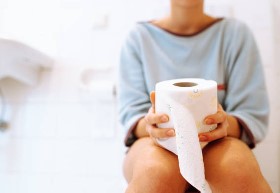Having a hard time releasing the tension from that belly?
If you’re looking for immediate relief from constipation while on the toilet, here are a few techniques you can try.
Proper positioning
Sit on the toilet with your feet supported on a small step stool or a stack of books, allowing your knees to be higher than your hips. This position can help align the rectum and make it easier to pass stool.
Relaxation techniques
Take deep breaths and consciously relax your pelvic floor muscles. Tension and anxiety can make it harder to have a bowel movement, so try to create a calm and relaxed environment.
Gentle massage
Using circular motions, apply gentle pressure to your lower abdomen in a clockwise direction. This can help stimulate bowel movement and relieve discomfort.
Warm water
Sip on a warm beverage, such as herbal tea or warm water with lemon. Warm liquids can help relax the muscles in the digestive tract and promote bowel movements.
Rocking or gentle movements
Rocking back and forth or gently leaning forward and backward while seated on the toilet can help stimulate the muscles in the intestines and facilitate the passage of stool.
Try the “squatting” position: If possible, elevate your feet on a step stool or use a squatting device to simulate a squatting position while on the toilet. This position can help align the rectum and ease the elimination process.
Remember, these techniques may provide immediate relief in some cases, but they may not address the underlying causes of constipation. It’s important to adopt long-term strategies to prevent constipation, such as increasing fiber intake, staying hydrated, engaging in regular physical activity, and establishing a regular toilet routine. If constipation persists or becomes chronic, it’s advisable to consult with a healthcare professional for a proper diagnosis and guidance on treatment options.
What to eat to prevent Constipation
To prevent constipation and promote regular bowel movements, it’s important to include high-fiber foods in your diet and stay adequately hydrated. Here are some specific foods that can help prevent constipation:
Fiber-rich fruits
Apples, pears, berries, oranges, prunes, and figs are all excellent sources of fiber. They can be eaten whole or added to smoothies, salads, or oatmeal.
Fiber-rich vegetables
Include plenty of vegetables like broccoli, Brussels sprouts, carrots, spinach, kale, and sweet potatoes in your meals. These provide essential nutrients and fiber.
Whole grains
Choose whole grain options such as whole wheat bread, brown rice, quinoa, oats, and whole grain cereals. These contain more fiber and nutrients compared to refined grains.
Legumes
Beans, lentils, chickpeas, and other legumes are high in fiber and can be added to soups, stews, salads, or made into delicious spreads like hummus.
Nuts and seeds
Almonds, walnuts, flaxseeds, chia seeds, and pumpkin seeds are good sources of fiber and healthy fats. Snack on them, sprinkle them on salads or yogurt, or add them to baked goods.
Healthy oils
Incorporate healthy oils like olive oil, avocado oil, and coconut oil into your cooking. They help lubricate the intestines and support healthy bowel movements.
Water and hydrating foods
Drink plenty of water throughout the day to stay hydrated. Additionally, consume hydrating foods such as watermelon, cucumbers, celery, and soups to support healthy digestion.
Probiotic-rich foods
Foods like yogurt, kefir, sauerkraut, kimchi, and other fermented foods contain beneficial bacteria that support a healthy gut and regular bowel movements.
Herbal teas
Certain herbal teas, such as peppermint tea or ginger tea, can have a soothing effect on the digestive system and may help relieve constipation.
In addition to incorporating these foods into your diet, it’s important to establish regular eating habits, chew food thoroughly, and engage in regular physical activity. It’s also advisable to gradually increase your fiber intake to allow your body to adjust. If you have any underlying health conditions or dietary restrictions, it’s best to consult with a healthcare professional or registered dietitian for personalized dietary recommendations.
What food that can cause constipation
While it varies from person to person, certain foods have the potential to cause constipation or worsen existing constipation symptoms. These foods include:
Low-fiber foods
Highly processed and refined foods like white bread, white rice, and most processed snacks tend to be low in fiber. A low-fiber diet can contribute to constipation.
Dairy products
Some individuals may experience constipation or have difficulty digesting dairy products, such as milk, cheese, and ice cream. This could be due to lactose intolerance or sensitivity.
Red meat
Consuming excessive amounts of red meat, particularly fatty cuts, can slow down digestion and contribute to constipation.
Fried and fatty foods
Fried foods and foods high in unhealthy fats can be difficult to digest and slow down bowel movements, potentially leading to constipation.
Unripe bananas
While ripe bananas can help relieve constipation due to their high fiber content, unripe bananas may have the opposite effect and contribute to constipation.
Processed snacks
Snacks like chips, cookies, and crackers are typically low in fiber and high in unhealthy fats and refined carbohydrates, which can contribute to constipation.
Unhealthy beverages
Caffeinated drinks like coffee and certain types of tea can have a dehydrating effect, potentially leading to constipation. Carbonated drinks and sugary beverages may also worsen constipation symptoms in some individuals.
Conclusion
It’s important to note that everyone’s digestive system is different, and what causes constipation in one person may not affect another. If you notice that certain foods consistently worsen your constipation symptoms, it may be best to avoid or limit them in your diet. It’s also essential to maintain a balanced and varied diet that includes plenty of high-fiber foods and to stay hydrated by drinking enough water throughout the day. If you have concerns about your diet or constipation symptoms, consulting with a healthcare professional or registered dietitian can provide personalized guidance.




